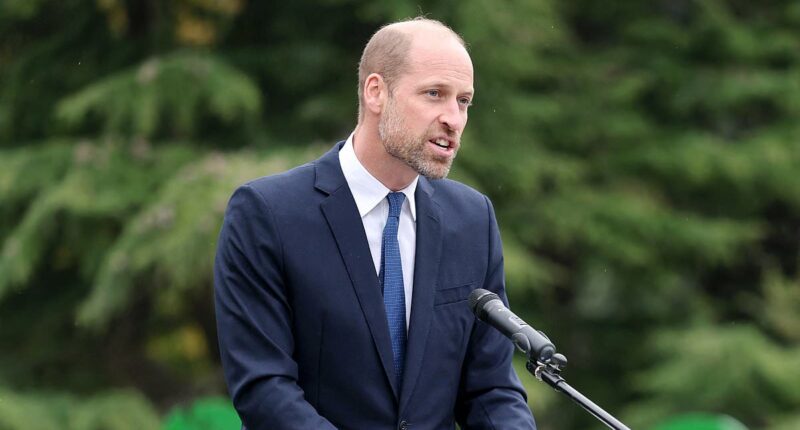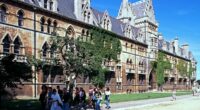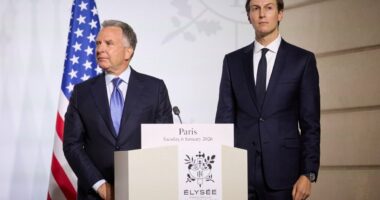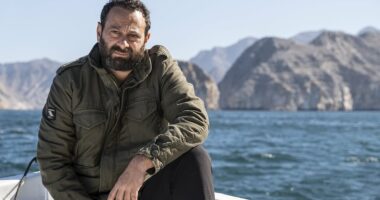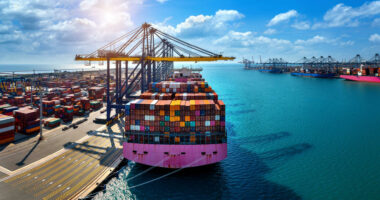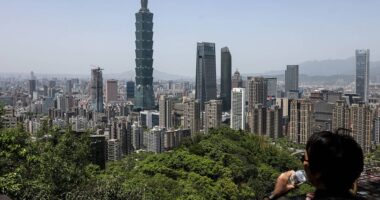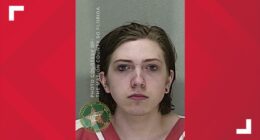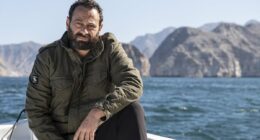Share this @internewscast.com

The Prince of Wales has spoken passionately about the humanitarian effort in Gaza and other global troublespots, describing it as a ‘thread of shared humanity’. And he urged nations to ‘champion and fight for their access to people in the most desperate of circumstances’. The future king insisted the work of humanitarian agencies ‘must remain sacroscanct’, praising the ‘incredibly brave’ men and women who stay behind to bring respite and compassion rather than running away from danger.

In a speech to launch the first global memorial to humanitarian aid workers at Gunnersbury Park in west London , Prince William said: ‘Around the world, far too many people continue to face unimaginable pain, suffering and loss, whether through natural disasters or man-made conflict and famine. ‘We are witnesses to the appalling suffering of those who are victims of war and violence from Ukraine to Sudan, from Myanmar to Haiti and indeed throughout much of the Middle East. And alas in so many other places.

‘Yet the presence of humanitarian aid workers, like those in Gaza, runs like a thread of shared humanity through even the grimmest of environments. ‘Rather than running away from danger, discomfort and hunger, these incredibly brave men and women stay behind to bring whatever respite, compassion and care they can to those who need it the most. ‘We must champion and fight for their access to people in the most desperate of circumstances.’ Prince William’s remarks on the situation in Gaza came shortly before he viewed the memorial to honour aid workers killed in service and those who continue to risk their lives. Created by the artist Michael Landy, it features 15 life-sized human figures linking arms and separated into groups of five.

Gaps between the groups allow visitors to stand within the sculpture to ‘complete the circle’. Each figure is inspired by the story of a specific aid worker. William later said: ‘I have had the privilege to hear from humanitarian aid workers directly about the challenging conditions they work in. From the representatives of humanitarian organisations in Palestine and Israel whom I met during my visit to the West Bank and Israel in 2018, and to the passionate UN staff who hosted me at the Jalazone refugee camp on that same visit. ‘And of course to those in Poland and Estonia supporting Ukrainian children and families fleeing the conflict as a result of Russia’s invasion. They do essential work in the most challenging of places.’

William said that ‘too often, hundreds of humanitarian aid workers around the world are killed while on duty’. Last year the number of aid workers killed on duty was 385 while this year it has already reached 300. He said: ‘Every single one of those deaths is a tragedy. A cruel affront to the international humanitarian principles which must remain sacrosanct. ‘One thing that should unite all of us is support and protection for those that seek to help others in the most dire situations. ‘The brave humanitarians that seek to feed and heal innocent people deserve our respect and deserve their safety. ‘Humanitarian aid workers bring solace in the darkest of times. ‘We must do more to recognise their service, and more to protect them.’

He added that he hoped that the memorial would ‘be a place both for quiet contemplation and for education. So that children now and in the future can learn about humanitarianism, and the remarkably brave men and women who, endanger their lives every day to help others in their hour of greatest need.’ Sir John Holmes, Chair of the Humanitarian Memorial Committee, who introduced the Prince on the stage, said he believed William would like to be more ‘engaged’ in humanitarian issues but is restricted by his role. He said: ‘I think he’d like to be more engaged in these issues but of course it’s very difficult for him because of his position.’

During the engagement, which included Lyse Doucet, the BBC ‘s chief international correspondent and Jeremy Bowen, the corporation’s International Editor, William expressed concern for those working in warzones. Bowen, the BBC’s Middle East correspondent, told William of the frustrations of journalists banned from gaining access to report on the war in Gaza . ‘Getting in for us is a big issue,’ Bowen said. ‘It is really designed to make it much harder for us to do our job. It’s quite a successful media policy to not let us in. That’s the issue that we face right now. ‘I’m going over for the anniversary of the attack next week but the place we need to be – it’s so weird when we’re in the wrong place.’

William told Doucet and Bowen: ‘There will come a time when you’re both needed a lot to explain what’s going on.’ Doucet told him that the ‘rules of war are being broken on an industrial scale’. William said: ‘You’ve seen it way more than most. You’re human at the end of the day and you see that going on and it’s very difficult not to be involved in the horrors of what’s going on.’ He added: ‘When you’re on the ground you see the whole picture, which is really important. That’s the downside of social media because you two spend your entire life trying to work out if that’s true or not.’

William heard a speech from Tom Fletcher, the United Nations Under-Secretary for Humanitarian Affairs and Emergency Relief Coordinator, who said: ‘Gaza is now the deadliest place on earth to be a humanitarian’. He spoke of a colleague who had been killed and another whose wife had been killed while staying in a safe house. Fletcher said: ‘Each attack on one of us, is an attack on all of us. Each unpunished crime is an indictment of global inaction. Someone fires the gun, someone gives the order, someone orders the coverup. So our demand is clear: protect civilians, protect humanitarians.’

Michael Landy, the artist commissioned to create the memorial after his London Underground project ‘Acts of Kindness’, said that he travelled to northern Sri Lanka with Care International to meet people who had lost their loved ones. He said: ‘I remember talking to the people and getting a sense of the loss. I knew that part of the memorial would be stories, either of an aid worker or a recipient of humanitarian aid. So you see the best and worst of humanity when you read the stories.’ The idea for a memorial was driven by Dr Elaine Laycock, a GP who worked as a humanitarian during the Bosnia conflict in the 1990s. Dr Laycock, 92, met the prince and described William’s involvement in the project as ‘huge’ and ‘very welcome’.

She said that she was ‘shot at by all sides’ when she went to the frontline in Bosnia in 1992 to deliver urgent medical provisions to a child. Two days after returning to the UK she had a message to say that her driver and two other friends had been killed. ‘We went to Heathrow to see their bodies come back in body bags in a cargo plane. No ceremony. And shortly after that I realised there was no memorial in the world. I started asking around saying ‘I’m not asking for money but do you think it would be a good idea?’ And everyone said yes.’

An excerpt from her late colleague’s diary, written in Bosnia, now features on one of the figures. It reads: ‘After what I have seen in this conflict, my life will never be the same again.’ Sam Rose, acting director of UNRWA, spoke to the prince about how colleagues on the ground in Gaza were apologising for coming into work late because they had to bury family members killed in the war. After speaking to the prince, he said: ‘I told him about the plight of humanitarian workers around the world, particularly in Gaza. Over 500 have been killed since the start of the war, and over 370 colleagues from UNRWA.

‘So we’ve got 12,000 staff in Gaza, and 370 of them have been killed, which is the largest single loss of the United Nations anywhere in the world ever. And these are normal people, you know, they’re doctors, they’re teachers, they’re garbage collectors, they’re social workers. ‘Many were killed just in their tents, because they’re displaced like everyone else. Some killed whilst carrying out their duties in emergency shelters.’ He added: ‘The prince has visited UNRWA facilities in the West Bank, so he’s familiar with the situation and he was interested in knowing, ‘How do they continue? What is it that keeps people going?’

‘You know, it’s kind of the lack of any alternative, because the scale of what people are dealing with means that you can’t process this amount of loss and grief and torment. But there will be a reckoning.’ William spoke to different groups, hearing stories of aid workers who had been injured in Gaza. Darren Cormack, chief executive of Mines Advisory Group, told the prince about a former British soldier who had been helping secure a unit for the UN in Gaza following an attack, only to be seriously hurt himself in a subsequent blast when a piece of shrapnel narrowly missed the artery in his leg by 1mm.
